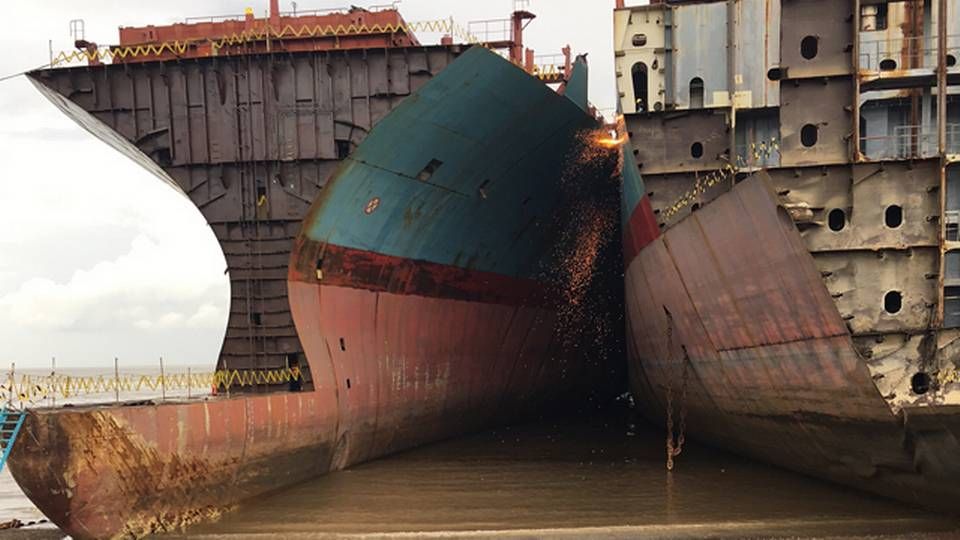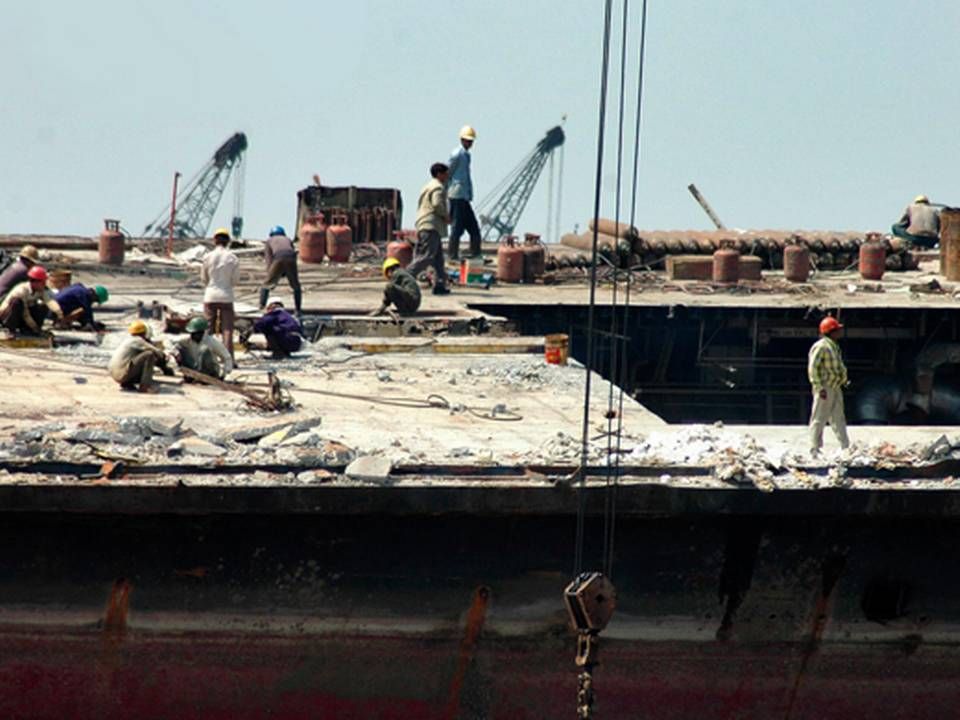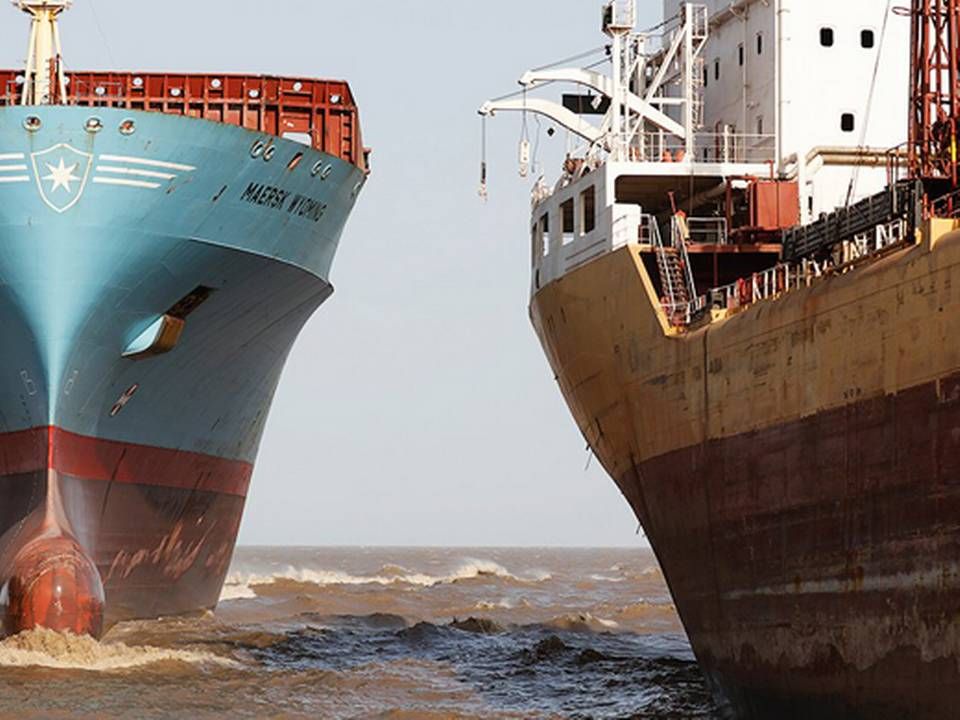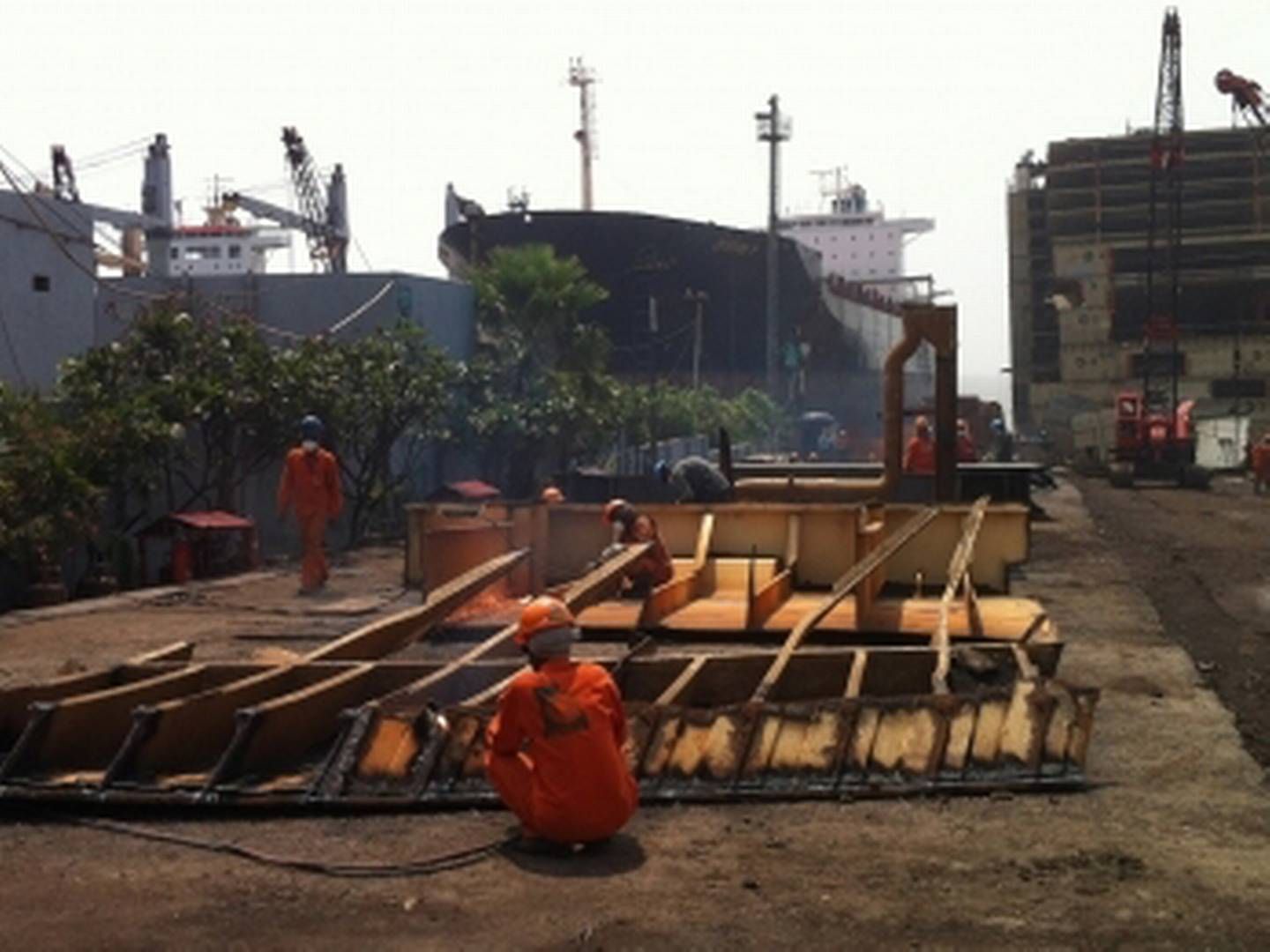Maersk was warned about pollution risks in Alang

Maersk was warned that there are severe environmental problems related to scrapping vessels in India, and that it will be very difficult as well as expensive to solve these problems.
The warnings came in a report commissioned by the shipping group itself in the months before Maersk changed its stance and decided to scrap vessels in the Indian coastal region Alang.
In the report, consulting firm Litehauz concludes that the recycling of vessels in the intertidal zone, where the ship is run up onto the beach and dismantled, historically has caused massive environmental pollution.
"All in all, the data show that intertidal zone ship breaking do lead to impacts from heavy metals, oil and oil residues and pathogens in the environment," notes the report, which was delivered to Maersk in October 2015.
The report looks exclusively at environmental issues related to the so-called beaching method and not at individual shipbreaking facilities, for which standards vary greatly between India, Pakistan, and Bangladesh.
There have also been improvements made at several yards in Alang in recent years, including at Shree Ram, which are not featured in the report's source material.
"Nevertheless, there are some activities that are the source of hazardous substances, which are difficult, unfeasible or perhaps even impossible to remediate, under the conditions of the intertidal zone," concludes the report, to which ShippingWatch has gained access through the Danish Environmental Protection Agency, EPA.
Maersk looking to help from within
The Maersk Group confirms to ShippingWatch that the report was ordered as part of the work preceding the decision to scrap ships in Alang. This is the only external environmental report the group commissioned, and the report was subsequently sent out to various NGOs.
Before the first two vessels, Maersk Wyoming and Maersk Georgia, arrived in Alang in May and June, the group performed additional inspections at the Shree Ram yard to ensure that the conditions were in order.
The group also explains that the intention has always been to actively participate in improving the conditions in Alang rather than wait for the problems to solve themselves. As such, Maersk knew that conditions would not yet up to par.
The inspections at Shree Ram, performed by Maersk and Lloyd's Register, have reduced the number of defects and shortcomings from 79 in February to 12 in August. Maersk is also monitoring the dismantling of the two container ships and plans to publish its own environmental report by the end of the year.
NGO: Maersk ignored the dangers
The desktop study by Litehauz looks exclusively at how the beaching method impacts the environment. It does not examine how the transport of equipment, waste, and hazardous waste which can pollute the environment when it is transported off the facilities.
"Likewise, those issues to be managed in relation to safety and occupational health including mooring, emergency access, asbestos, hot work and safe entry are important in their own right and may lead to secondary emissions to the environment, if not managed properly," writes Litehauz.
Maersk has settled in at the world's ship graveyard
The NGO Shipbreaking Platform was consulted in relation to the preparation of the report last summer. Policy Director Ingvild Jenssen says that Maersk subsequently decided to consciously ignore the dangers related to beaching.
"Maersk has ignored the Litehauz findings and took the decision to sell the Wyoming and Georgia to Shree Ram despite knowledge of the environmental harm it inevitably will cause," she tells ShippingWatch, adding that the primary cutting of the Wyoming and Georgia is being conducted in the intertidal zone where pollutants cannot be contained.
Standard bearer for beaching
Shipbreaking Platform also criticizes the fact that Maersk has made itself into the standard bearer for Alang at a time when the EU is working to implement tightened requirements for how carrier's get rid of their end-of-life vessels.
The EU Commission is currently putting the final touches on a proposal for a list of shipyards which are approved for shipbreaking. The list will come into force by the turn of the year, after which EU-flagged ships, or ships whose last port of call was in Europe, may only be scrapped at approved shipyards.
By setting the bar high, the EU is halting the progress currently taking place in Alang, says Maersk, and the group is prepared to out-flag vessels in order to circumvent the EU regulations. Shipbreaking Platform, however, believes that the company is removing the shipyards' incentive to improve by selling vessels as scrap to them at this early stage.
"Maersk has now become one of the strongest lobbyists for the low-cost method of beaching - a method that is banned in Europe, the US and China and which Maersk itself, until recently, loudly denounced for its poor standards and lack of innovation," says Ingvild Jenssen.
The EU's proposal will be subject to a vote at a committee meeting in November at which officials from the 28 member states will vote on the list. According to ShippingWatch's sources, Denmark will be one of several countries which will argue in favor of the Indian shipyards being included on the list.
Denmark's Environment and Food Minister, Esben Lunde Larsen (Danish Liberal Party, V) has also announced that the country will work to ratify the IMO's Hong Kong Convention next year, as the next of so far five countries to do so.
Carriers flooding to Southeast Asia
According to most estimates, some 70-75 percent of the global commercial fleet is being scrapped in India, Pakistan, and Bangladesh.
last year alone, 469 vessels ended their life on the beaches in Southeast Asia, but this number will likely increase this year as carriers strive to reduce the overcapacity in an effort to create a better balance between supply and demand in the shipping industry.
When the carriers prefer to sell their vessels as scrap in the Southeast Asian nations, it is because the shipyards here pay a higher price per ship than in, for instance, China and Turkey, where the standards are higher.
Maersk has in the past stayed out of Alang, while several Norwegian carriers have also decided not to use Indian shipbreakers. But it is the exception rather than the rule to see global carriers setting any kind of requirements for shipbreaking. Instead, they tend to sell their vessels to whoever pay the highest price.
According to Shipbreaking Platform, Greek shipowners sold the most vessels to the Southeast Asian shipbreakers last year, followed by the German shipowners in second place.
Alang union: Working conditions are too dangerous
Cash buyer GMS applauds Maersk's arrival in Alang
NGO: Denmark does Maersk a favor by ratifying Hong Kong Convention
Related articles
Alang union: Working conditions are too dangerous
For subscribers
Cash buyer GMS applauds Maersk's arrival in Alang
For subscribers





















